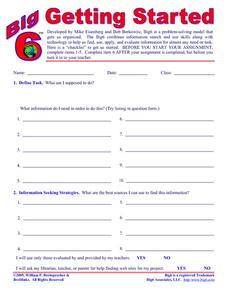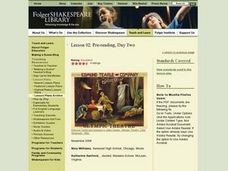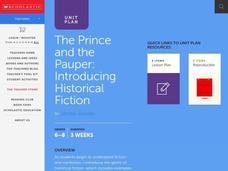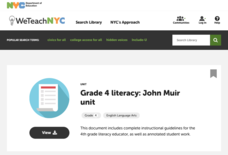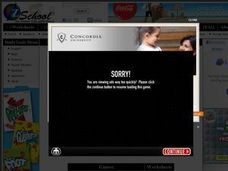Shakespeare Globe Trust
Fact Sheet: Costumes and Cosmetics
Theatre producers in Shakespeare's time didn't have the special effects that are common today, so they had to get creative. Using the handout, pupils explore the topic of costume design. Additionally, readers learn about the stage makeup...
British Council
A Midsummer Night's Dream
Shakespeare's A Midsummer Night's Dream takes center stage in an interactive designed for an audience of English learners. After watching a short animated version of the play, individuals read a printed version of the script, match the...
William P. Breitsprecher & Breitlinks
Getting Started
Set your pupils up for successful completion of projects with a six-step process to help with planning, time management, and reflection. Individuals fill out the first five sections of this handout before they begin their projects,...
Scholastic
Fly Guy Maze
Invite your kids to fly from the start to the end of this maze. Based around Hi! Fly Guy by Tedd Arnold, the goal of the maze is to help Fly Guy and Buzz Boy escape a pirate ship.
Scholastic
Fly Guy Word Find
Have your pupils buzz along and find all of the words in this grid! The words are related to Hi! Fly Guy by Tedd Arnold, so this would be a great resource to use alongside a reading of one of the Fly Guy books.
Roald Dahl
Matilda - Bruce Bogtrotter and the Cake
After reading the 11th chapter in Matilda, class members take on the role of Bruce Bogtrotter and re-enact the cake eating scene. Here's the catch: they must come-up with an impromptu re-enactment of the scene from the story, and...
Roald Dahl
The Twits - Muggle-Wump Has an Idea
If a bar of chocolate was on the floor, would you try to pick it up? What if it was covered with glue? The eighth lesson in an 11-part unit designed to accompany The Twits by Roald Dahl has scholars imagine crazy scenarios. The...
Roald Dahl
The Twits - Mrs Twit
"A person who has good thoughts cannot ever be ugly." The second activity in an 11-part unit that accompanies The Twits by Roald Dahl uses poetry to encourage positive character traits. Mrs. Twit has ugly thoughts, but those...
Curated OER
Shakespeare: Julius Caesar
Before your high schoolers read Julius Caesar, have them complete this thought-provoking activity! To familiarize them with some of the play's most important lines, break the class into pairs and have them create a skit around...
Curated OER
Little Red Hen Bakes Bread
Students investigate the bread baking process through the use of literature. In this reading comprehension lesson, students read the book, The Little Red Hen and discuss the steps the hen followed to bake bread. Students bake the bread...
Curated OER
The Prince and the Pauper
Mark Twain, the famous American author, is often studied in the school system. Use "The Prince and the Pauper" to analyze the differences between the text and its video version. This lesson includes several culminating project...
Curated OER
Persuasive Speech in Julius Caesar
After reading Julius Caesar 1.2 and 1.3, break your class into pairs for this role-play. Each pair will receive one of four prompts (or more, if you create additional examples), in which one person tries to persuade the other to do...
New York City Department of Education
Grade 4 Literacy: John Muir Unit
Learn how to correctly analyze and score a written performance task. Example work shows annotated think alouds for grading. Teachers also have access to graphic organizers for helping writers succeed,
New York City Department of Education
Grade 3 Literacy: Investigating Sharks
Shark! Scholars read about sharks in Facts about Sharks by Susanna Batchelor. They then pretend they are shark scientists and choose a shark they want to study. Learners research their sharks and record information in graphic organizers...
Curated OER
On the Cutting Edge
Introduce the background of design and designers and their role in communicating their thoughts to others. In groups, you can assign participation in a writing cluster on various designers and write paragraphs to submit to magazines. To...
Curated OER
Lesson 8: Prithee, Pause!
High school learners examine primary source materials on history and the supernatural which relate to Julius Caesar. They then act out a scene based on different historical understandings and identify facts, theories, and similarities in...
Ken Taylor
The Stones: Guilty or Not Guilty?
Young drama pupils will perform a number of expressive speaking exercises as they consider the themes of responsibility, consequences, and justice in the very modern Australian play The Stones. With a lot of role playing and...
Curated OER
Trite Expressions Worksheet 1
In this grammar worksheet, students read twenty sentences to find the trite expression in each one and then think of a creative way to rephrase it.
Curated OER
The Scarlet Letter Vocabulary Words--Set 1--Flash Cards
Now this is a cool way to study vocabulary. Kids can click on the EZ Flash Cards to revile definitions, test themselves, or prep for reading. The vocabulary on these flash cards are all taken from the Nathaniel Hawthorne tale, The...
Savvas Learning
Verbs: Review
Designed as a review of verbs studied in first three chapters in this grammar series, the 16-page packet includes activities, worksheets, games, and assessments.
Curated OER
Spelling
After viewing this slide show, which goes over the mosts common reasons for misspellings, students take a short quiz. They must choose the correct version of the underlined word in each sentence, or choose option D; which means "no...
Curated OER
Using Commas Correctly
Commas can be complicated. Help learners achieve a greater understanding of comma usage with this handout, which includes two different comma activities. Following given directions, young writers punctuate provided sentences and combine...
Curated OER
To Kill a Mockingbird Quiz
Why is it a sin to kill a mockingbird? Test your readers with these multiple-choice questions from To Kill a Mockingbird. The quiz features some challenging, lesser-known questions about the novel.
Read Works
Columbus Was an Explorer
Get the inside scoop on the European explorer, Christopher Columbus, with a response to reading activity that requires scholars to answer who, what, why, when, and a variety of other questions about the word crew.


